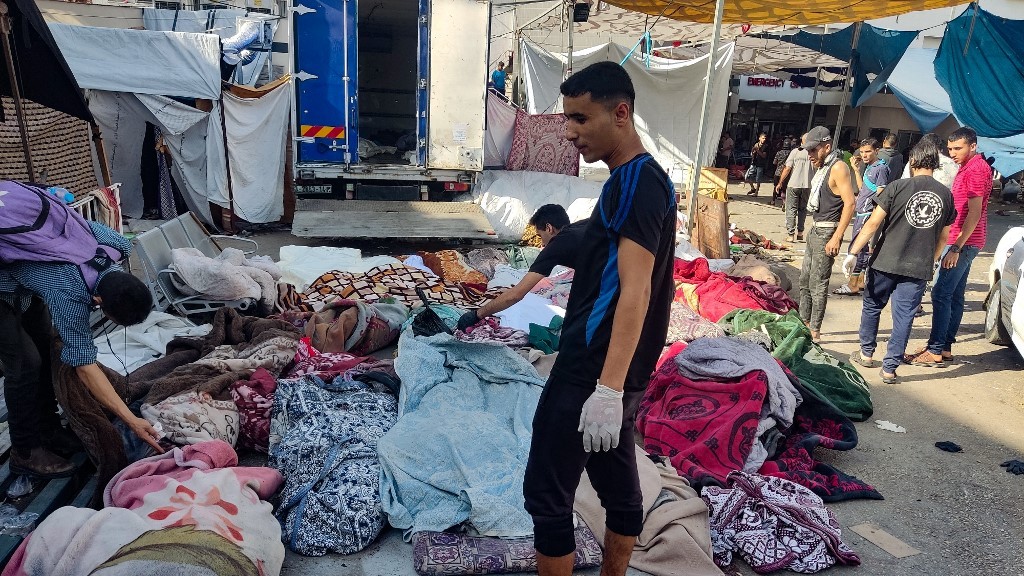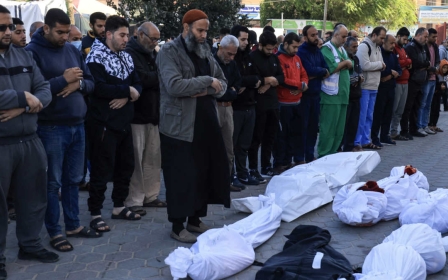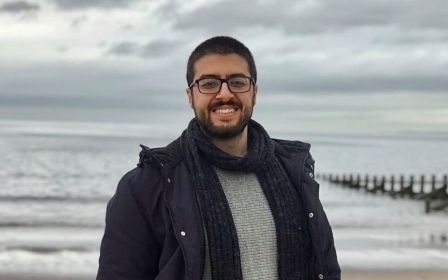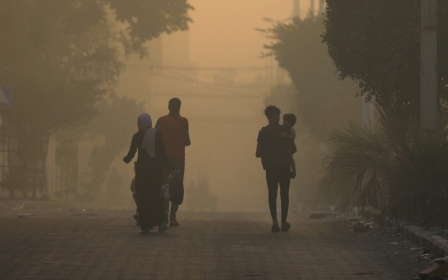Israel-Palestine war: Woman taking shelter in UN school killed by Israeli air strike
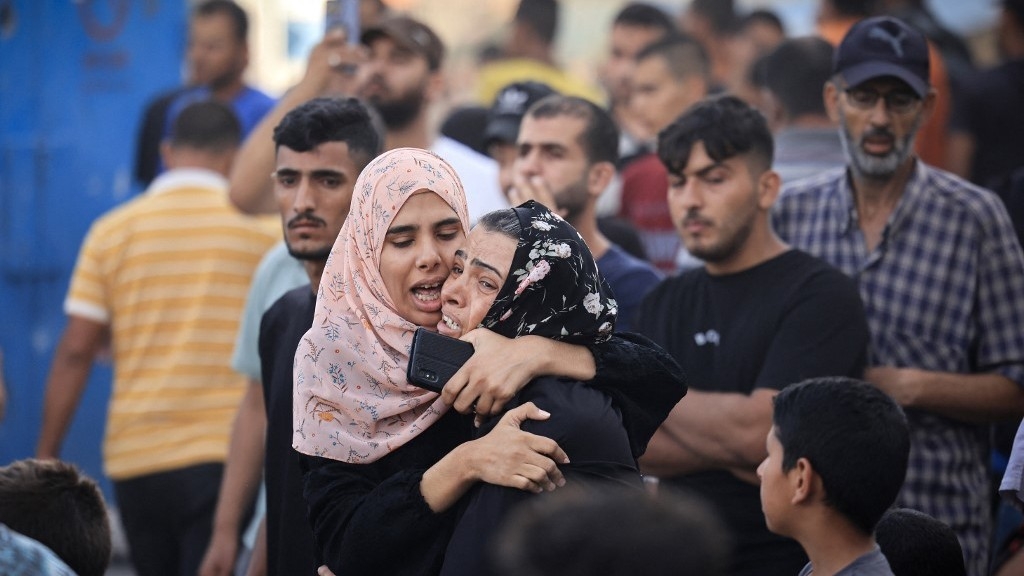
Om Ahmed Jendiya was in the toilet of Tal al-Hawa School in Gaza on Wednesday, 8 November, when shrapnel from an Israeli missile penetrated her chest and immediately killed her.
The 35-year-old Palestinian woman had taken refuge in the United Nations Relief and Works Agency (Unrwa) school to escape the Israeli bombardment of her neighbourhood in the east of Gaza City.
She and her four children left their home on 11 October, believing that a UN school would be the "safest place in Gaza" during the Israeli invasion that has killed at least 11,000 Palestinian civilians since hostilities with Hamas began on 7 October.
"Women and men usually stand in queues outside the toilet to use it. Om Ahmed had just entered it after around 10 days of not being able to take a shower. Once she entered, insane Israeli bombing started," Kamel Ubaid, a displaced 31-year-old man, told Middle East Eye.
"We were in the playground and started rushing to the classrooms to take shelter. Shrapnel was falling on us like showers, and the bombing was intense and lasted for several minutes non-stop. While we were running, a young man was injured by shrapnel in the back, and we suddenly heard women screaming near the toilets."
New MEE newsletter: Jerusalem Dispatch
Sign up to get the latest insights and analysis on Israel-Palestine, alongside Turkey Unpacked and other MEE newsletters
Ubaid and a number of other men returned to the toilets to see what was going on.
"A large crowd of women were outside the hospital, and suddenly one woman got out of the bathroom, struggling to carry [Jendiya]. The scene was horrible. I could not describe it using any words. Both Om Ahmed and the woman carrying her were covered in blood. Her wound was horrific and her flesh was out," Ubaid said.
In the around 360 sqkm Gaza Strip, dozens of Unrwa schools are located in densely populated neighbourhoods, surrounded by residential buildings and healthcare facilities.
According to the UN agency, at least 100 of its employees have already been killed.
Follow MEE's live coverage of the Israel-Palestine conflict
With no phone signal available due to the blackout imposed on Gaza since the beginning of Israel's military onslaught, displaced people at the school could not call an ambulance.
In the first week of the attack that began on 7 October, Israeli fighter jets bombed the headquarters of the two main telecommunication companies as well as their infrastructure across Gaza.
Since then, residents have been facing partial blackouts, struggling to make phone calls, send text messages, or access the internet.
But on 27 October, Israel cut all communication networks across the blockaded enclave, leaving the more than 2.3 million residents in a complete blackout, unable to communicate with each other or call civil defence services or ambulances.
Although the networks were partially back around 36 hours later, the complete blackout has been imposed again several times for multiple hours ever since.
"We tried to call an ambulance several times. Although the Red Crescent headquarters is only a few metres away from the school, we could not reach out to them. So her brothers and cousins carried her to the al-Quds hospital [around 200 metres away]," Ubaid said.
But Jendiya was already dead by the time she reached the hospital.
Medics at the hospital wrapped her body in a shroud and put it in a large bag before they transferred it to al-Shifa hospital, Ubaid said.
Her relatives could not go with them to continue the last procedures and attend her burial as the bombing was still continuing. The medics refused to take them for fear that the ambulance would be hit by an air strike or an artillery shell, as happened in other incidents, he said.
"Her children could not go with them to al-Quds hospital. They left them here in the school. Today, after their mother was killed, everyone is trying to take care of them. They are still very young. The oldest is only around 11 years old."
Hospitals under attack
As of Friday, at least 35 ambulances had been destroyed, 198 healthcare professionals killed, and 135 hospitals and medical facilities targeted in Israel's bombardment of the strip, according to the Palestinian Ministry of Health in Gaza.
On Friday alone, six hospitals across the coastal enclave were targeted by Israeli air strikes, artillery shells and snipers, including al-Quds hospital, al-Nasr Hospital for Children, the Indonesian Hospital, al-Rantissi hospital, and al-Shifa hospital, which remains under siege as of Saturday morning.
Of the 35 hospitals around the strip, at least 22 have stopped working due to the recurring attacks and the lack of fuel.
'We can be targeted at any moment, even when we are inside the classrooms'
- Ahmed abu Riziq, displaced Palestinian
Because residents of Gaza remain at risk even in the two relatively safest places - hospitals and Unrwa schools - many displaced people say they wish to return home as "every place is bombed".
"If my home was not severely damaged and rendered uninhabitable, I would certainly return home because there is no need to stay here," Ahmed Abu Riziq, who has taken refuge at Tal al-Hawa school, told MEE.
"The situation is dire. No aid or food is provided, we struggle to fill a few bottles of water from the nearby [al-Quds] hospital every day, and, most importantly, we can be targeted at any moment, even when we are inside the classrooms.
"I swear to God, if my home was not damaged and the way home was safe, I would not stay here for one day," he said.
"You tell me UN [facilities] are supposed to be safe? Try to spend one night here while they are bombing the neighbourhood and let me know how safe you feel."
Middle East Eye delivers independent and unrivalled coverage and analysis of the Middle East, North Africa and beyond. To learn more about republishing this content and the associated fees, please fill out this form. More about MEE can be found here.


